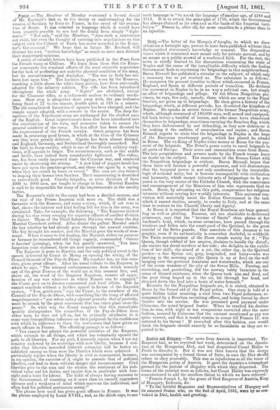Sla13.—The letter of the Marquis d'Azeglio, to which we drew
attention a fortnight ago, proves to have been published without that distinguished statesman's knowledge or consent. The despondent views which it contained were meant only for private perusal, and by no means as a public avowal of a confirmed faith. For the rest, the news is chiefly limited to the discussions concerning the state of Naples and the cause of the inexplicable difficulty which the Italian Government finds in repressing the brigandage in that. neighbourhood. Baron Ricasoli has published .a circular on the subj ert, of which only a summary has as yet reached us. The substance is as follows : He compares the present troubles to those which occurred in Fiance, England, and Spain at different periods of transition. He declares the movement in Naples to be in no way a political one; but simply an affair of brigandage and pillage. Of the fifteen Neapolitan pro- vinces, he says, five only, namely, those which are near to the Papal frontier, are given up to brigandage. He then gives a history of the brigandage which, at different periods, has desolated the kingdom of Naples. He speaks in severe terms of the former Neapolitan army, which, although composed of 180,000 men, well armed andequipped, fell back before a handful of heroes, and who since have abandoned themselves to brigandage, sometimes carrying the Bourbon flag, which they have dishonoured by not defending, as they now dishonour it by making it the emblem of assassination and rapine; and Baron Ricasoli regrets to state that the brigandage in Naples is the hope of the European reactionary party, which has placed its citadel in Rome. The ex-King of Naples coins money at Rome for the pay- ment of the brigands. The Peter's pence serve to enrol brigands in all parts of Europe. Their arms and ammunition come from Rome. The late perquisitions and arrests made by the French troops leave no doubt on the subject. The connivance of the Roman Court with the Neapolitan brigandage is evident. Baron Ricaseli hopes that these facts will furnish a powerful argument, and will demonstrate that the temporal power is not only condemned by the irresistible logic of national unity, but is become incompatible with civilization and humanity, which cannot tolerate acts of brigandage to be pre- pared in the very centre of the Catholic Church, with the connivance and encouragement of the Ministers of him who represents God on earth. Rome, by advancing on this path, compromises her religious interests without serving her worldly interests. This universal con- viction will materially assist the Italian Government in the task which it cannot decline, namely, to render to Italy, and at the same time to restore to the Church; liberty and dignity.
At Rome it is reported that the Royal Bourbons are busy quarrel- ling as well as plotting. Rumour, not too charitable to dethroned princesses, says that the "heroine of Gaeta" shies plates at her husband's head, which, on some occasions, have passed through the windows and fallen into the court-yard of the Quirinal, to the great scandal of the Swiss guards. One anecdote of this Amazon is too graphic, even if its authenticity is somewhat doubtful, to withhold. The Turin correspondent of the Times stands surety for it : "The Queen, though robbed of her sceptre, disdains to handle the distaff; she carries her dread revolver at her side; she delights in the exhibi- tion of her skill; she aimed at a cat, the other day, in the Quirinal garden--a fine Syrian cat, grey, long-tailed, and hairy—who was basking in the morning sun (the Queen is up at five) on the wall hanging over the grottoed fountains and waterworks, which are one of the seven wonders of the city of the Seven Hills. Purring, and stretching, and gambolling, did the unwary tabby, luxuriate in the sense of blessed existence, when the Queen took aim and fired, and the poor thing leaped up in the air, hit through her head, and dropped down like lead into a basin of water beneath." Recruits for the Neapolitan brigands are, it is stated, obtained in Rome by the formal aid of the Papal police. One story is told of a quiet Italian tailor receiving a visit from two Papal policemen, ac- companied by a Bourbon recruiting officer, and being forced by sheer threats into the service. He was promised good payment under Chiavone, the noted brigand leader. When he reached his destina- tion he was, with eight or ten companions recruited after the same fashion, assured by Chiavone that the amount mentioned as pay was quite correct, and that it would remain in arrear till Francis II. was restored to his throne ! If recruited after this fashion, one would think the brigands should scarcely be so formidable as they are re- ported to be.






























 Previous page
Previous page